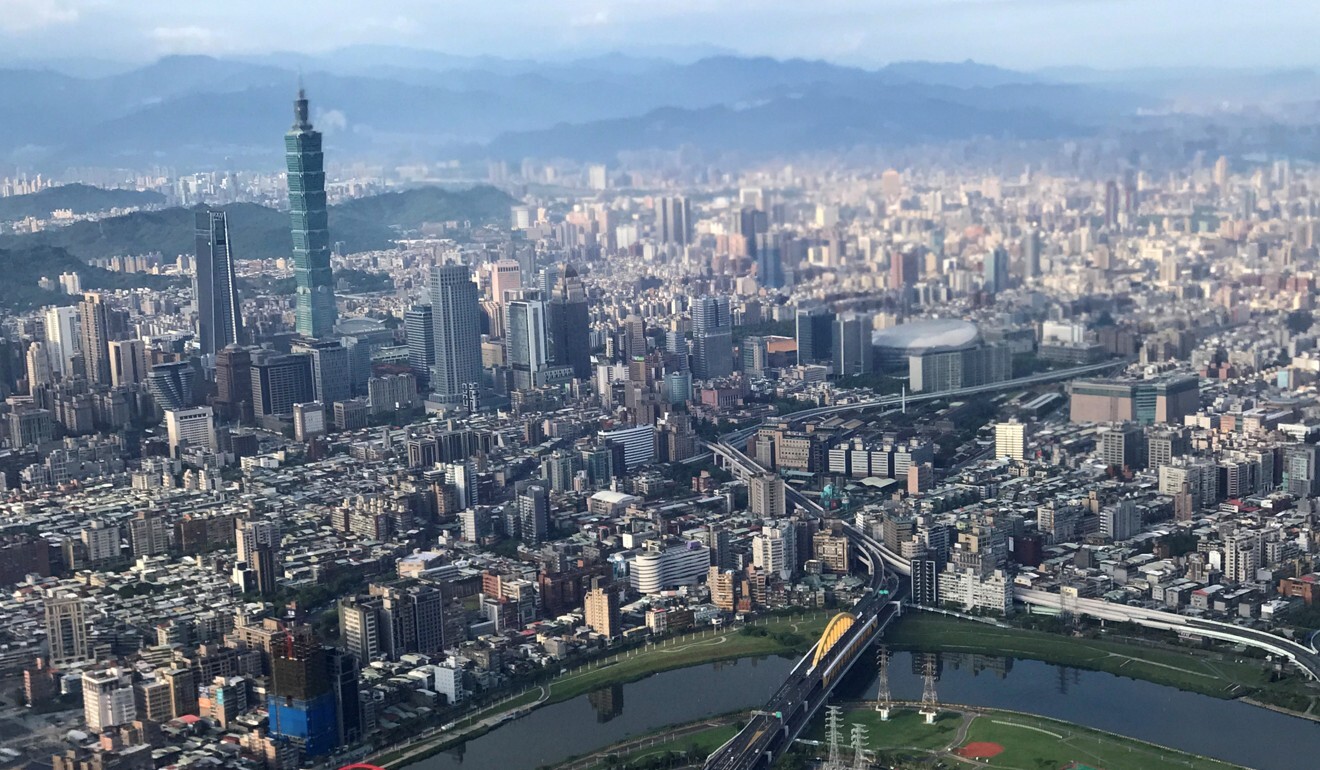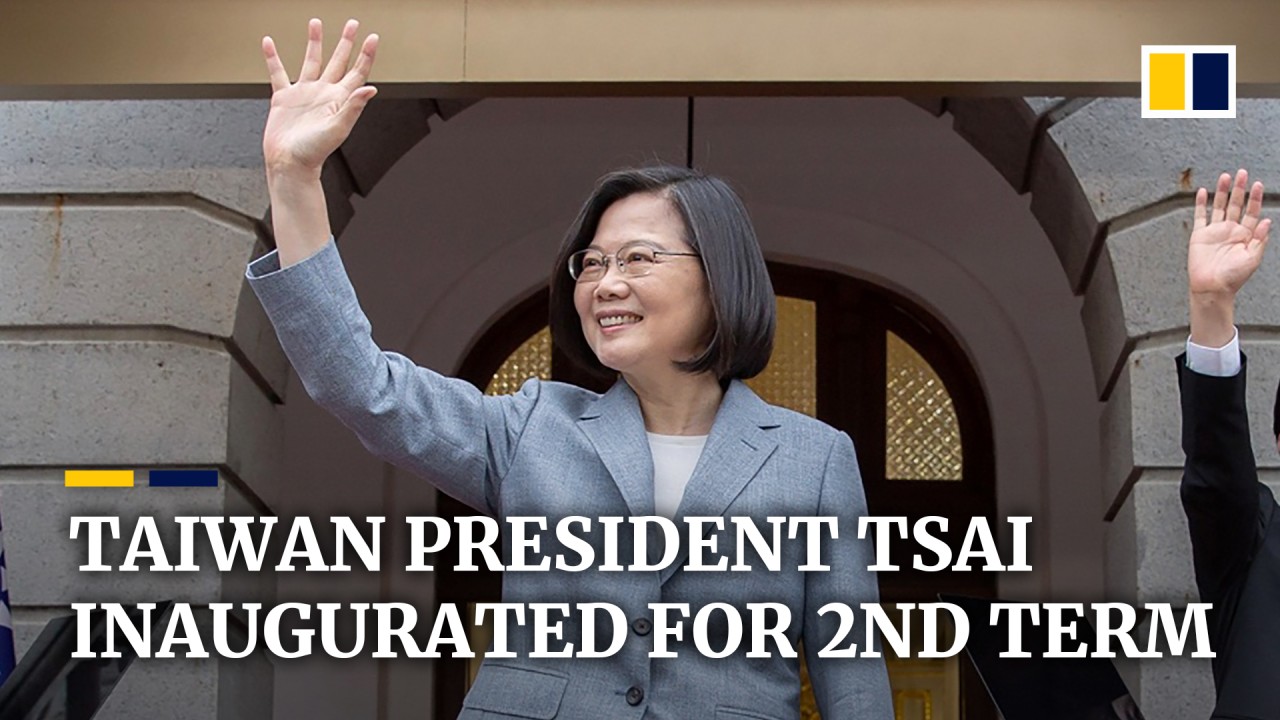In second inaugural address, Tsai lays out plans to prepare Taiwan for a changing global economy
- President Tsai Ing-wen calls for Taipei and Beijing to ‘coexist over the long term’, but analysts say her focus is mainly on domestic agenda
- Priorities include industrial and economic development, as well as reforms for social welfare, national security and modernised governance

Taiwanese President Tsai Ing-wen will head into her second term with a renewed focus on building the island’s economy and governance reform, analysts said, while navigating the challenges of cross-strait tensions with Beijing.
The leader of the democratic island laid out her priorities for industrial and economic development in an inaugural address on Wednesday morning, along with reforms for social welfare, national security and modernised governance.
Tsai, of the independence-leaning Democratic Progressive Party (DPP), emphasised the need to prepare Taiwan to weather global economic changes as well as the Covid-19 pandemic, for which Taipei’s response has been held up as an international model.
“Thanks to our successful control of the pandemic, so far, Taiwan is able to maintain positive economic growth,” she said. “This is rare in the world. However, we need to continue to take early action on economic relief and revitalisation, and do whatever it takes to maintain stable economic growth.”
Tsai, Taiwan’s first female leader, was re-elected in a landslide in January, with a record number of votes seen as an endorsement of her cross-strait policy towards Beijing, which claims sovereignty over the self-ruled island.
It was a remarkable turnaround after the DPP suffered a massive defeat in the November 2018 local elections over issues such as unpopular labour and pension reforms, with Tsai’s political comeback propelled in part by Beijing’s threats and anti-government protests in Hong Kong.
Tsai’s remarks included a call for Taipei and Beijing to “coexist over the long term”, but analysts said her speech was focused primarily on her domestic agenda.
On economic policy, she said that Taiwan would continue to develop its six core strategic industries, including its semiconductor and information and communications technologies, and build self-sufficiency in production of face masks, medical supplies, energy and food.
She also said Taipei would seek trade and investment agreements with the US, Japan, and European countries, while continuing its New Southbound Policy to boost economic ties with Southeast Asia and South Asia.
“Over the next four years, only those who can end the pandemic within their borders, lay out a strategy for their country’s survival and development and take advantage of opportunities in the complex world of tomorrow will be able to set themselves apart on the international stage,” she said.
While Taiwan’s rapid and aggressive response to the pandemic helped mitigate its economic impact, the island’s economic growth still slowed in the first quarter of the year to 1.54 per cent, compared to 3.24 per cent in the first quarter of 2017.
Tsai, 63, also said that Taiwan’s Legislative Yuan would set up a constitutional amendment committee to push forward constitutional reforms, including lowering the voting age from 20 to 18, along with progress on judicial reforms and the establishment of a National Human Rights Commission。
“Our judicial reforms are still in transition, and our current progress has not yet met the public’s expectations,” Tsai said. “I will continue to solicit opinions from across society and keep pressing forward. The people’s dissatisfaction drives us to continue on the path of reform.”
The mainland-friendly Kuomintang (KMT), the main opposition party, released a survey on Tuesday assessing Tsai’s first term, which found higher approval for her policies on social welfare, social security, and environmental protection but lower approval on economic development, judicial reforms, labour protections and low wages.
Jeremy Huai-Che Chiang, research associate for the Taiwan-Asia Exchange Foundation, said the economy was “clearly the focus” for Tsai over the next four years, continuing its 5+2 Innovative Industries Programme to adapt to changes in the global economy.

“She has laid out her policy agenda quite clearly in this speech,” he said. “National defence reforms is also a key topic in her speech, especially after much public discussion on the current state of our military reserve and mobilisation systems. Management and institutional reform, not only arms procurement, are seen as important.”
Mark Harrison, senior lecturer in Chinese studies at the University of Tasmania, said that Tsai’s address also stressed welfare reform and industry policy, along with the modernisation of governance. He noted in particular proposals to reform the Examination Yuan and Control Yuan – two of the government’s five branches, respectively responsible for managing the civil servants and monitoring the other branches.
“Both of those organs are legacies of the original [Republic of China] ROC constitution that sought to look back to traditional Ming and Qing imperial governance systems,” he said, using the official name for Taiwan. “Tsai is wanting to bring them into the 21st century.”
“Beijing is always very wary of constitutional reform in Taiwan and while these proposals from Tsai should not be an issue, Beijing will no doubt be following them closely.”
Harrison said Tsai had the leadership team and momentum to carry out her second term agenda, with “very significant political capital after her win in January, while the KMT remains weakened”.

